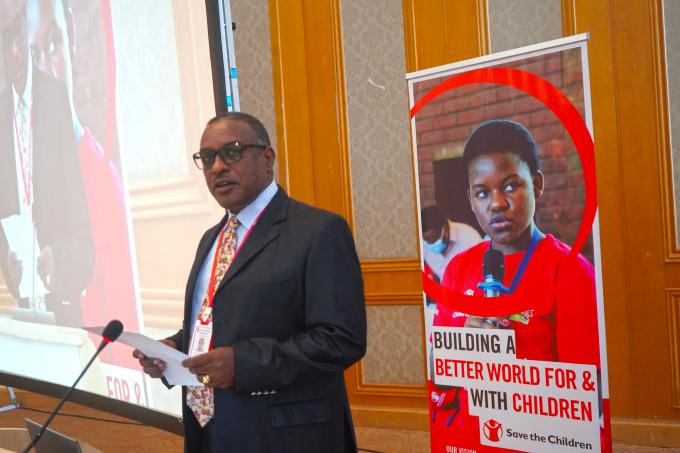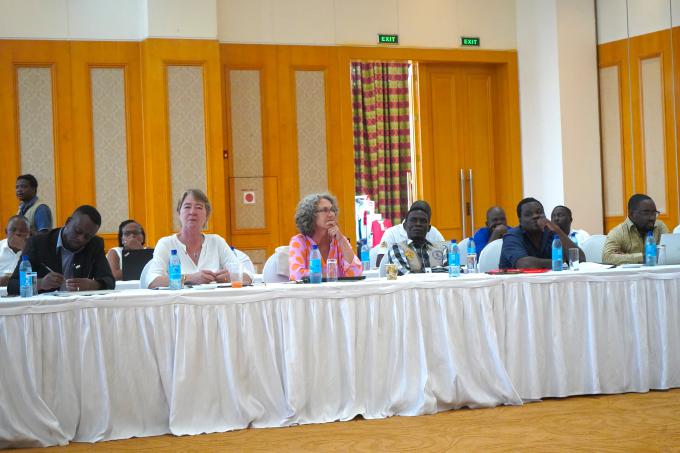Save the Children Study Unveils Alarming Food Security and Nutrition Projections for Malawi in 2024-25

Lilongwe, February 2, 2024 – A Workshop on Predictive Modelling for Nutrition-Sensitive Anticipatory Actions took place today at the Bingu International Conference Centre (BICC) in Lilongwe. The event, organized to address the escalating malnutrition crisis in Malawi, brought together key stakeholders, government representatives, and Save the Children officials.
Save the Children Malawi Country Director, Ashebir Debebe, welcomed stakeholders by delivering a stark message. "Our analysis reveals alarming trends: The cost of a nutritious diet has risen steadily, outpacing income growth. Many households are struggling to adequately feed themselves and their children. The ongoing el nino is projected to result in significantly reduced yields, exacerbating existing poverty. We need to act now in advance of predictable impacts for at-risk households."
Blessings Muwalo, representing the Nutrition Department Director of the Malawi Government, emphasized the severity of the situation. "Malawi faces a formidable adversary - Malnutrition. All other challenges stem from its grip. Malnutrition has infiltrated every facet of our nation, affecting our minds, yet we often fail to confront it."
Muwalo continued, "If left unaddressed, the long-term impacts on future generations will be severe. The battle against malnutrition demands our attention and collective action. Save the Children's initiatives are precisely the kind of efforts we seek from our partners."
Malawi faces one of the highest rates of malnutrition in Southern Africa, with 36% of children stunted (MICS 2019-20). The root cause lies in a poor diet, driven by poverty, food insecurity, and worsened by climate change and rising food prices. The recent prediction of above-normal temperatures, delayed onset, and dry spells due to El Nino poses a severe threat to agriculture yields, impacting an already distressed population.
Study Findings Present a Bleak Picture:
New trend and predictive analyses of the nutrition and food security situation in Malawi ahead of El Nino-related impacts were presented. Using Save the Children’s two flagship tools Cost of the Diet (CotD) and Household Economy Analysis (HEA), detailed findings of recent trends and predictions for the consumption year of April 2024 to March 2025 were shared, focusing on Neno and Zomba Districts. These analyses revealed that even before considering el Nino-related impacts, there has already been a huge rise in the cost of a nutritious diet in Malawi (between April 2023 and July 2023), with fewer and fewer households able to afford a nutritious diet.
The seasonal forecast indicated increased temperatures, below-normal seasonal rainfall, and extended dry spells, projected to result in a below-average 2024 maize harvest. Combined with persisting poor economic conditions and high staple food prices, el nino-related impacts are likely to, push poor and very poor households to high levels of food insecurity.
The study predicts that poorer households in Zomba and Neno districts will face large income and food gaps throughout much of the upcoming consumption year. Specifically, the analysis highlighted that 64% of the population in Neno and Zomba Districts will face food and income gaps, amounting to 36,560 households or 255,920 people. the study indicates critical gaps will be earlier and more severe than normal in these two districts. Mothers and young children are especially vulnerable, since most of children’s growth and development happens during pregnancy and until the child is 2 years, and this is the period when children are most likely to become sick and malnourished with lifelong consequences.
Proposed Anticipatory Actions:
The study proposes Anticipatory Actions from March 2024, to protect poor households’ essential livelihoods and ensure all household members have enough food and income to meet their most basic needs. Anticipatory Actions proposed include Agriculture inputs, including maize seed, sweet potato bundles, and fertilizer to boost household production; combined with cash assistance, and mother and young child focused interventions to protect their nutritional needs and prevent malnutrition.
Audience Feedback:
During the presentation, the audience expressed agreement with the study's findings, emphasizing the urgency of acting earlier (than current efforts) to protect poor households’ livelihoods, food and nutrition security and prevent a rise in future anticipated malnutrition. Participants called for stronger data systems and improved coordination amongst stakeholders, especially across sectors (climate, agriculture, health, and nutrition) to better prepare for, act in advance of and respond to upcoming crises.

 Malawi
Malawi